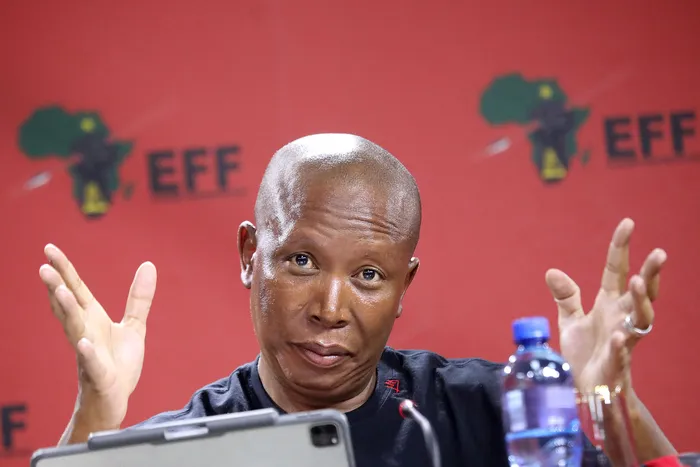
The British High Commission in South Africa formally apologised to EFF leader Julius Malema after visa delays prevented him from attending a Cambridge University conference.
Image: Timothy Bernard / Independent Newspapers.
A senior member of the EFF has confirmed that party leader Julius Malema and others are not planning to withdraw their visa applications to visit the United Kingdom, after a party delegation was not provided with visas to attend a conference at Cambridge University this weekend
Malema was invited by the African Society of Cambridge to speak at the 11th Annual Cambridge Africa Together Conference but could not leave OR Tambo International Airport in Johannesburg as their visas did not arrive in time.
Taking to social media platform X, Malema said he was at the airport when he received a letter, four hours before his departure, informing him he had been denied a visa.
“The British authorities have denied me a visa to London for the Cambridge Conference this weekend, providing no substantial justification. It is clear to me that this is an attempt to silence a dissenting political perspective,” he said. “This is unacceptable and spineless.”
His party has condemned the decision with spokesperson Sinawo Thambo describing the incident as 'nothing more than an expression of bureaucratic process being used to suppress political dissent and to ban the voices of the EFF from building global solidarity against Western imperialism'.
A senior party leader said senior party leaders would not withdraw their visa applications, citing the possibility of future invites from African Society of Cambridge or other entities in the UK.
In an interview on Thursday, the source said while the party was still deliberating on the matter, it had no intention of withdrawing the applications for a visa to the UK.
"We might have other invites, and we will not be deterred by this denial," the source said.
Another senior source within the party said that the US and its views on Malema may have played a role in the 'polite denial' of his visa application.
"The US has been vocal against Malema due to his stance against white supremacy and the UK and the US are on the verge of signing a trade deal…so the UK might not want to risk that ," the source said.
In a letter to EFF deputy president Godrich Gardee, the UK High Commissioner to South Africa, Antony Phillipson, said the Home Office had faced delays in processing his visa application in time for his trip.
Phillipson said that he wanted to "personally apologise" that the Home Office in the UK had been "unable to process the application in time owing to the necessary steps required to consider visa applications and the unfortunate timing of some recent UK Bank Holidays".
He said that he would take "personal interest in the issue" and had agreed to refund the application fee.
"I recognise that this will be deeply disappointing, especially as the delegation applied in advance and some paid for priority service," the letter read.
The EFF has framed the incident as part of a broader attempt to silence critical voices opposed to imperialism and capitalism.
"We will continue to build relations with all those who appreciate the message of the EFF," the party said in a statement.
"We will not be discouraged from building global solidarity against imperialism and capitalism, and thanks the students of Cambridge University for recognising and appreciating the voice of the Commander in Chief of the EFF as one that is leading the resistance of imperialism and the independence of Africa."
Meanwhile lobby group AfriForum praised the UK decision not to grant Malema a visa, saying it was calling on the international community to take punitive action against Malema for his "Kill the Boer chant".
The group's CEO Kallie Kriel on X said: "To ensure that Malema cannot act with impunity, international intervention is now necessary".
Political analyst Sandile Swana said external pressures may have influenced the UK's decision.
"It's not easy to say that this is entirely innocent. The decline of the visa has been polite, but it's difficult to say it was not intentional," Swana said.
Swana further asserted that the timing of the visa denial is suspicious, given the UK's current negotiations with the US on a trade deal.
"The UK is in the final stages of negotiating a trade deal with the US and seeking to be treated as one of the favorite junior partners of the US after Israel. So we don't know whether this could be an effort by the US and the UK to send a warning message to the EFF and the ANC leaders that there may be actions," Swana said.
mashudu.sadike@inl.co.za
Related Topics:
